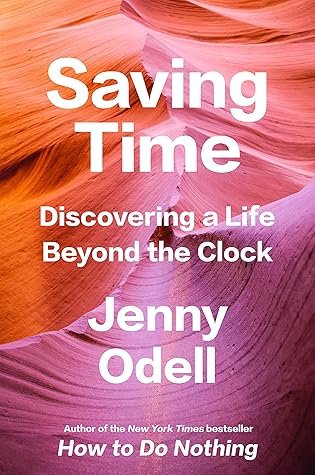More on this book
Community
Kindle Notes & Highlights
by
Jenny Odell
Read between
May 18 - June 5, 2023
It also affects whether we see the world and its inhabitants as living or dead-alive.
What if these actions were not the mindless ticking of a clockwork universe, but the actions of a who?
Understanding the invention of modern mechanical clocks, the historian David Landes writes, means first asking who needed them.
every society makes social determinations about what is worth spending time on, as well as how much.
the more temporal surveillance a job entails, the less likely it is to be done by someone white or male.
are you the boss of your own mind?
the concept that each individual has an equal “supply” of these fungible hours to exploit is still the bedrock of mainstream time management.
“Do you need a therapist, or do you need a union?”
discretionary time is that which, strictly speaking, you don’t have to use for something. You just choose to do so, for whatever reason. This idea allows us to distinguish between someone who truly has no free time and (for example) an ambitious person who voluntarily works long hours according to personal notions of necessity, only to wish she had more time.
What songs are audible when the wind stops? What has been kept alive in the time snatched from work and sheltered from ongoing
destruction—what moments of recognition, what ways of relating, what other imagined worlds, what other selves? What other kinds of time?
the ‘time is money’ equation doesn’t work in reverse.”
“Euro-Westerners have come to divide the world into a clear hierarchy of the divine, the human, and nature—from greatest to least, in that order.”
declinism, the belief that a once-stable society is headed for inevitable and irreversible doom.
As distinct from a clearheaded (and heartbroken) assessment of our situation, declinism is probably one of the more dangerous forms of linear, deterministic time reckoning there is.
most Americans conceive of climate change within an environmental, scientific, or economic lens, but not a moral or social justice one.
WHEN WE ALLOW the climate crisis a moral dimension, certain things lost in the haze become clearer, including its relationship to other fundamental injustices.
Is it really true that everyone sees time as money? Or is it true that everyone spends all their time wishing it didn’t seem like money?
The capital has its order, the village its customs.”
the gift of disability studies in general, which is a questioning of what the good life means not just for disabled people, but for every person with a body that is not a machine and
“Is the clock of industrial time built for bodies at all?”
Ed Yong observed in an April 2020 Atlantic piece that, with the Covid-19 pandemic, many abled people were thrust into a vexed relationship to time and proximity to mortality that sounded deeply familiar to those of the disability community.
Maybe “the point” isn’t to live more, in the literal sense of a longer or more productive life, but rather, to be more alive in any given moment—a movement outward and across, rather than shooting forward on a narrow, lonely track.
I get to touch the planet all day long.”
But for this to happen, for there to be “more of less of me,” the forward-leaning ego that grasps at time has to die—at least for that moment.
“time outside history,” or “women’s time, queer time, Black, Indigenous time….The time that doesn’t get recorded in the ‘great archives’ of our species by the white men who write them, who write of progress.”
“he who ‘joined the Resistance, found himself.’
There were annual growth rings on the clam shells; they reminded me of the lines on my forehead that appeared during the pandemic. Apparently, it was a time when many people aged faster, a collective compression of our biological clocks.


